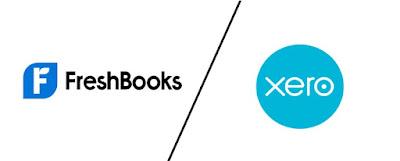Introduction
Are you tired of drowning in a sea of spreadsheets and invoices? Do you find yourself spending more time on paperwork than actually running your business? It's time to take control of your finances with the help of an efficient accounting tool. In today's digital age, two names stand out among the pack – FreshBooks and Xero. These powerful cloud-based solutions are designed to simplify bookkeeping, invoicing, and financial management for businesses both big and small.
But which one is right for you? In this blog post, we'll dive deep into the features, pros, and cons of FreshBooks vs Xero. By the end, you'll have all the information needed to make an informed decision that will transform how you manage your accounts. So let's get started and discover which accounting tool reigns supreme!

What Is FreshBooks vs Xero?
When it comes to managing your business's finances, having the right accounting tool is crucial. Two popular options in the market are FreshBooks vs Xero. Both platforms offer a range of features to help streamline your bookkeeping processes and keep your financials in order.
FreshBooks is a cloud-based accounting software designed with small businesses in mind. It offers a user-friendly interface that makes it easy for non-accountants to navigate. With FreshBooks, you can track income and expenses, create professional-looking invoices, manage projects, and even accept online payments from clients.
On the other hand, Xero is another cloud-based accounting solution that caters to businesses of all sizes. It provides robust features such as bank reconciliation, expense tracking, inventory management, and payroll processing. Xero also integrates seamlessly with third-party apps like PayPal and Stripe for smooth payment transactions.
Both FreshBooks and Xero have their strengths and weaknesses. FreshBooks excels in its simplicity and ease of use but may lack some advanced features that larger businesses require. On the other hand, while Xero offers more comprehensive functionality suitable for medium-sized or growing businesses, it may have a steeper learning curve for those who are not familiar with accounting principles.
Choosing between FreshBooks vs Xero depends on the specific needs of your business. Consider factors such as size of your company, complexity of financial operations required, and budget constraints when making this decision.
Whether you choose FreshBooks or Xero as your accounting tool, you'll be able to streamline your financial processes so you can focus on what really matters - growing your business!
The Pros And Cons Of FreshBooks
FreshBooks is a popular accounting tool that offers several advantages for businesses. One of the main benefits is its user-friendly interface, which makes it easy to navigate and understand even for those who are not accounting experts. The platform provides a simple and intuitive dashboard where users can easily manage invoices, track expenses, and generate financial reports.
Another advantage of FreshBooks is its invoicing features. The platform allows you to create professional-looking invoices and send them directly to clients via email or snail mail. It also enables you to set up recurring invoices, automate payment reminders, and accept credit card payments online.
FreshBooks also offers excellent customer support with prompt responses from their team. They provide various resources such as tutorials and webinars that help users make the most out of the software.
However, there are some drawbacks to using FreshBooks as well. One limitation is that it may not be suitable for larger businesses with complex accounting needs. While it works well for small businesses or freelancers, it might lack advanced features required by larger companies.
Additionally, FreshBooks has limited integrations compared to other accounting tools in the market like Xero. This means that if your business relies heavily on third-party integrations or needs specific integrations with industry-specific software, FreshBooks may fall short in meeting those requirements.
FreshBooks is an excellent choice for small businesses or freelancers who need a user-friendly accounting tool with robust invoicing capabilities and exceptional customer support. However, larger businesses or those requiring extensive integration options may find better alternatives elsewhere.
The Pros And Cons Of Xero
Xero is a popular accounting tool that offers a range of features to help businesses manage their finances. Like any software, it has its pros and cons. Let's take a look at some of them.
One major advantage of using Xero is its user-friendly interface. The platform is intuitive and easy to navigate, making it accessible for both beginners and experienced users alike. Additionally, Xero offers robust reporting capabilities, allowing you to generate detailed financial reports with just a few clicks.
Another benefit of Xero is its extensive integrations with other business tools. It seamlessly integrates with various applications such as CRM systems, payment gateways, and project management platforms. This integration can streamline your workflow and save you time by automating tasks.
On the downside, some users have reported that the learning curve for Xero can be steep, especially if you're not familiar with accounting principles or software in general. While there are resources available to help you get up to speed, this initial learning period may be challenging for some.
Additionally, while Xero offers many features tailored towards small businesses, larger organizations may find certain functionalities missing or limited compared to more enterprise-focused solutions.
Note, Xero has many advantages such as its user-friendly interface and extensive integrations but also drawbacks like the potential learning curve for new users and limitations for larger organizations. When considering whether Xero is right for your business,it's important to evaluate your specific needs against the functionality provided by the software.
Which Accounting Tool Is Right For Your Business?
Choosing the right accounting tool for your business can be a daunting task. With so many options available, it's important to carefully consider your needs and priorities.
FreshBooks offers a user-friendly interface that is perfect for small businesses or freelancers who are just starting out. Its invoicing features are top-notch, making it easy to create professional-looking invoices and track payments. However, FreshBooks may lack some of the more advanced features that larger businesses require.
On the other hand, Xero is known for its robust functionality and scalability. It offers comprehensive accounting tools that can handle complex financial tasks such as inventory management and multi-currency transactions. This makes Xero ideal for growing businesses with more sophisticated needs.
The decision between FreshBooks vs Xero depends on factors such as the size of your business, your industry-specific requirements, and your budget. If you're a small business owner or freelancer looking for simplicity and ease-of-use, FreshBooks may be the right choice for you. However, if you anticipate rapid growth or have complex financial needs, Xero might be worth considering.
To make an informed decision about which accounting tool is right for your business, take advantage of free trials offered by both FreshBooks and Xero. Experiment with each platform's features and see which one aligns best with your specific needs.
Conclusion
When it comes to choosing the right accounting tool for your business, both FreshBooks vs Xero have their own unique advantages.
FreshBooks is known for its user-friendly interface and features that cater specifically to small businesses and freelancers. It offers a simple invoicing system, time tracking capabilities, and excellent customer support. However, it may lack some of the more advanced accounting features that larger businesses require.
On the other hand, Xero is a robust accounting software with comprehensive features suitable for businesses of all sizes. It offers powerful reporting tools, multi-currency support, and integrations with other business apps. However, its interface can be overwhelming for beginners compared to FreshBooks.
The choice between FreshBooks vs Xero depends on your specific business needs. Consider factors such as the size of your business, required functionality, budget constraints, and ease of use when making your decision.
To make an informed choice before committing to either platform:
1) Take advantage of free trials or demos offered by both FreshBooks and Xero.
2) Identify your must-have features based on your industry requirements.
3) Seek recommendations from fellow entrepreneurs or professional accountants who have used either software.
4) Consider scalability - choose a solution that can grow with your business in case you need additional functionalities down the line.
5) Evaluate pricing plans to ensure they align with your budget.
Remember that no single accounting tool will be perfect for every business. It's important to carefully evaluate each option based on what matters most to you – whether it's simplicity or advanced functionality.
So take some time to explore both FreshBooks and Xero before making a decision. Whichever one you choose will undoubtedly help streamline your financial management tasks so you can focus more on growing your business!

